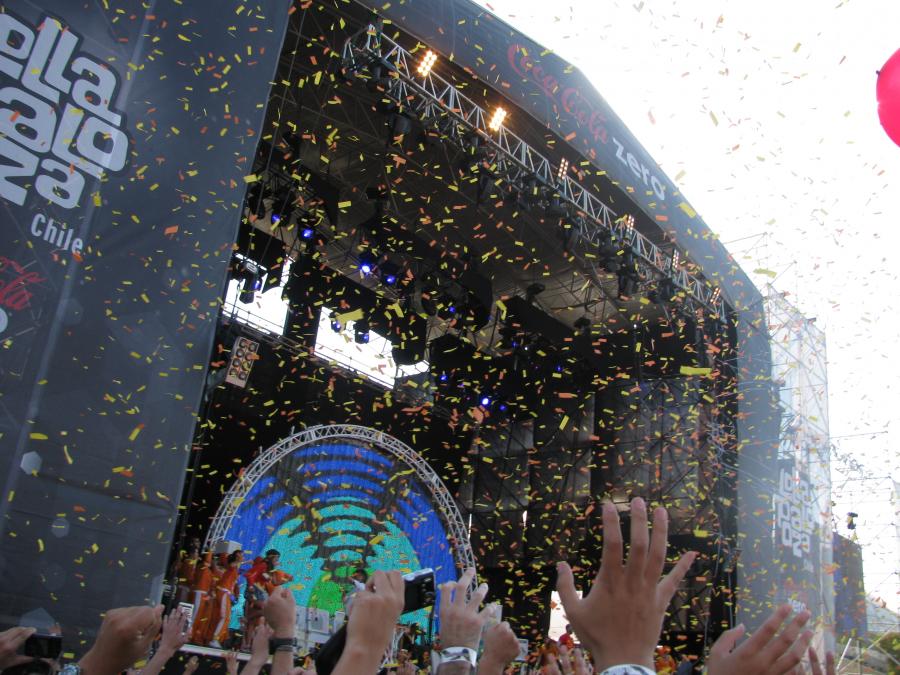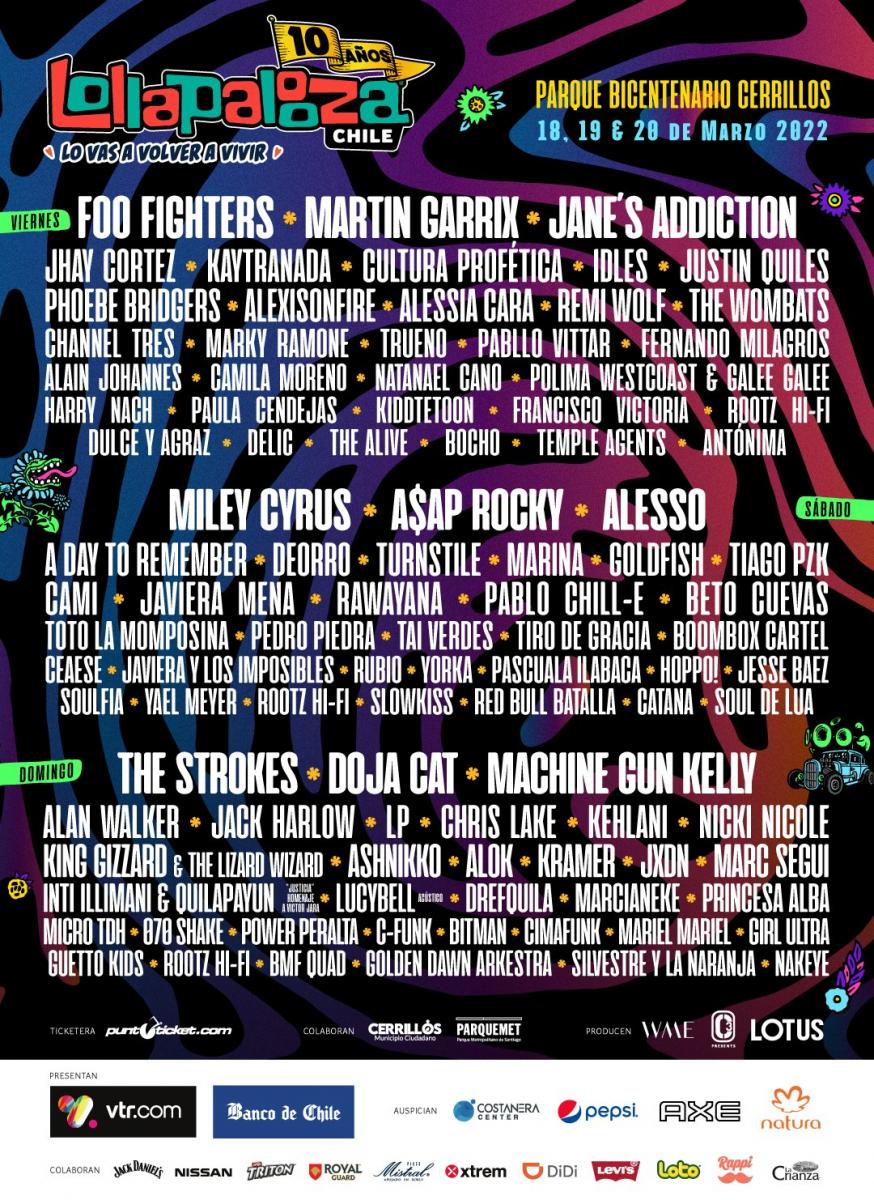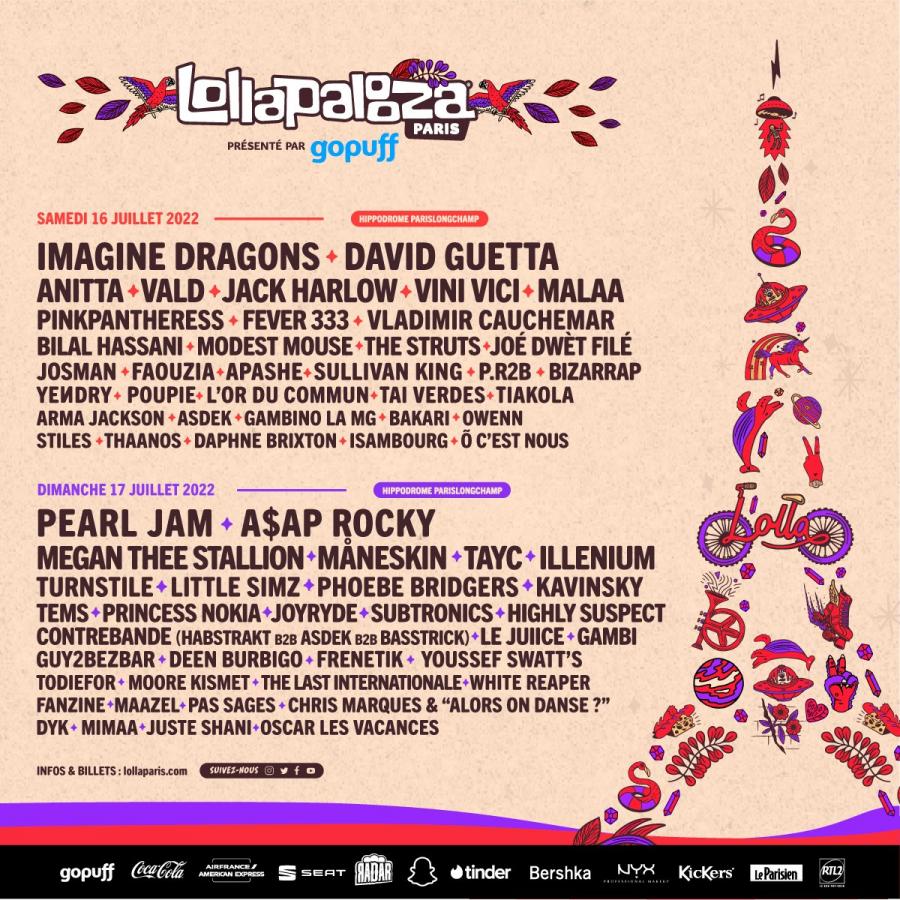
Globalization and music festivals: the case of Lollapalooza
Globalization and music festivals are two concepts that go hand in hand. Woodstock was one of the first large festivals in history, and as early as 1969 it set the standards. Since then, festival line-ups have been augmented by more global offerings and major pop artists. Following this tradition, in recent years we have seen festivals making a logical step. Events such as Lollapalooza have expanded from one venue in Chicago to eight around the world. Without going any further, the Barcelona music festival Primavera Sound, which has had a similar evolution to the analyzed festival (the two started as an independent music festival and ended up as a macro pop festival), also has expanded. In just one year and one pandemic, it went from 2 editions in 2 different countries to 7 editions in 6 different countries in 2022.
While there are clearly music festivals made up exclusively of local artists, festivals have always been a meeting place for people from different countries or cities and a territory for the mixing of musical genres and cultural backgrounds. In this article, I will explore the tension between the local and the global in music festivals. To do so, I will focus on the Lollapalooza festival and take the theoretical framework of Jan Nederveen Pieterse's three paradigms of globalization to delve into this tension and study with which one fits best. Furthermore, I consider it important to keep in mind that festivals not only present a cultural offer, but above all, they are a commodified experience, an idea that will run through the article.
Lollapalooza Festival: eight countries under one name
Lollapalooza is one of the largest music festivals in the world. It started as a touring event in 1991, but established itself in Chicago in 2005, where it now is celebrated annually. In 2011, the festival launched a branch in Santiago de Chile. The next year the Brazilian version was announced, in São Paulo, and two years later, in 2014, it also started in Buenos Aires, Argentina. In the same year, the first European edition was announced, which was held in Berlin, Germany. Two more later, the French edition started in Paris. The last addition to this world tour is Stockholm, Sweden, which started in 2019. Now the first Asian edition has been announced. It will be held in 2023 in Mumbai, India. The festival is known for its mix of genres and its emphasis on music categorized as "alternative", with a now more commercialized perspective.

Figure 1. Photo of Lollapalooza Argentina.
Music festivals and globalization, a strained relationship
The concept of globalization is difficult to define. As already pointed out by Nederveen Pieterse, this phenomenon brings more controversies than consensus. The author defines it as an "empirical process of increasing economic and political connectivity" and a "subjective process" of "collective awareness of growing global interconnectedness" (Nederveen Pieterse 2009, 16-17).
Music festivals interfere with globalization in several ways. First, they serve as a meeting point for people from different parts of the world, with different origins and cultural backgrounds. These are united under the same time and space, contributing to the exchange of ideas and cultures. The same happens with artists and musical genres.
However, some research has shown that this is not always the case. Linda Wilks states in her research that “the attendees of all the festivals [analyzed] were remarkably similar to each other in terms of socio-demographic characteristics” (Wilks 2010, p. 12). She adds that “they tended to be from the middle classes and to possess higher levels of academic qualifications” (Wiks 2010, p. 12). This shows that the exchange is not as real as one might suppose, but it can still exist because people can still differ in cultural backgrounds. The relationship, however, is a different one. In addition, as Max Peter Baumann points out, there is always one dominant culture over the other (Baumann 2001) in this type of exchange.
On an economic level, music festivals generally provide a boost to the area where they are held. They are usually placed in locations of tourist interest, or festivals can turn them into that. This also has its counterpoint. Maarouf Moulay Driss notes in his paper on music festivals in Morocco that "major efforts are invested to classify cities into recognizable spaces, cultural, historical, spiritual, etc, for touristic purposes" (Moulay Dris 2013, p. 2). He adds that "enactment of difference by the festival and appropriation of similarity by western subjects mirror matters of choice and priority in adjoining the cultural with the authoritative, more-deserving fetish of circulation" (Moulay Dris 2013, p. 2). Tourism can also pose a danger to the city's population, as is the case in many European cities with rental prices (Yrigoy, 2018).
Much of this problem is explained by the commodification of culture, another fact closely linked to the relationship between music festivals and globalization
Much of this problem is explained by the commodification of culture, another fact closely linked to the relationship between music festivals and globalization. In many cases, and as this article published in Diggit Magazine refers, "the interaction between local subcultures and the commodification of global culture in this context produces a symbolic economy of authenticity" (Bennett & Peterson, p. 46), generating global cultural tourism (Hubar, 2019).
Back to Nederveen Pieterse, he defined three paradigms of globalization, two of which seem to fit with this tense relationship. One of them he called McDonaldization and defined it as "world-wide homogenization of societies through the impact of multinational corporations" (Nederveen Pieterse, 2009, p. 51). On the other hand, he presents hybridization, a mixing of cultures. "An antidote”, he says, “to the cultural differentialism of racial and nationalist doctrines because it takes as its point of departure precisely those experiences that have banished, marginalized, tabooed" (Nederveen Pieterse 2009, p. 55).
We will focus on these three paradigms of Nederveen Pieterse, and apply them to the Lollapalooza festival. We will see to which of them this complex relationship between music festivals and globalization applies, in order to unravel the relationship between the local and the global. To do so, we will take into account the global bet of the festival, through its different venues, and analyze its line-ups.
National culture in the edition of Paris and Santiago de Chile

Figure 2. Poster of the 2022 edition of Lollapaloza Chile

Figure 3. Poster of the 2022 edition of Lollapaloza France
To analyze the line-up, we are going to focus on the French and Chilean editions. Chile was the first country in which Lollapalooza landed after settling in Chicago, back in 2011. The Paris edition landed a few years later, in 2017. Even so, in a short time, it has become the larger European edition, with 130.000 attendees last year. Being already more than established festivals, we will analyze the 2022 line-ups to unravel what peculiarities they have and the strength of local artists. After this, we will take into consideration some aspects of the festival such as the sponsors and the opinion of the attendees.
At a glance, the analysis is clear: artists from Chile and France predominate in the two programs, followed by the United States. It is also significant enough that the third country belongs to the same continent: Mexico in the case of Chile, and Belgium in the case of France. Argentina is quite high in both cases.
However, things change if we look at the headliners and the artists playing on the main stages.
In the case of Chile, there was not a single Chilean artist as a headliner. Even so, many of them played on the main stages. Some of them even played in the evening, the peak time for these stages. In the case of France, the ratio is balanced, with the presence of French artists both as headliners and on the main stages. One of them, however, is David Guetta, who would be a headliner at any festival.
Therefore, national artists are the prominent ones in both festivals. But when analyzing the most outstanding artists by the festival, we see that things change and the United States is the winner. Most of the world's most recognized pop artists come from this economic giant. The key, perhaps, lies in the balance. Would it be a culturally relevant festival if it did not reflect the rich cultural activity of these countries? Or if it did not include artists from outside the country? Would it be a commercially successful festival if it did not feature major international artists?
Now we will focus on sponsors. This is also relevant because festivals imply the commodification of culture and therefore the economic aspect must be considered. Of course, culture does not escape from capitalism.
In the Paris edition, the sponsors of American companies are more abundant, which is not the case in Chile. Even so, in Paris, there are quite a few companies from bordering countries. We can see how they generally choose to show proximity, without renouncing the big sponsors that can also be relevant from a cultural and economic point of view. Moreover, two of the Chilean companies are owned by foreign companies. And yet, they chose the national company instead of the parent company as a sponsor.
Let us focus on subjective perception, now. Julia Krajka, Matilda Gustafsson, and Victor José Vallim da Silva, at the University of Jönköping in Sweden, analyzed the perceptions of festival-goers at the Swedish and Brazilian editions of Lollapalooza. Through their surveys, they concluded that for both festivals attendees valued above all — and above the brand and its global reputation — the line-up (Krajka, Gustafsson & Vallim da Silva, 2020, p. 42). They also found that attendees favorably valued the presence of local artists. They believed that festivals had to adapt to the culture of the country. (Krajka, Gustafsson & Vallim da Silva, 2020, p. 48). At the same time, attendees also believed that there should be international artists.
The effect of the pandemic on music festivals’ identity
The analyzed festivals took place in 2022, being the first editions after the hurtful Covid-19 stop. At a glance, it can be seen that this high presence of national artists was not so much the norm before the pandemic. In the case of the Berlin festival, it goes to an extreme. At the 2022 edition, the vast majority of artists were German, including headliners. It was not quite like that before.
Here is a very interesting fact. First, the difficulties of international movements that still remained at that point led the music festivals to play it safe and book a big number of national artists. This can be seen in the 2022 edition of Primavera Sound. The presence of national artists in this edition was one of the largest ever seen at this festival. In the line-up announced for 2023, the presence of national artists is partly back to the normality of the festival: relatively low compared to the rest of the program.
On the other hand, the pandemic accelerated the processes of neoliberalism and globalization
On the other hand, the pandemic accelerated the processes of neoliberalism and globalization. One of the consensuses Nederveen Pieterse exposes is linked to regionalization (Nederveen Pieterse 2009). Although he refers to the creation of regions and the loss of power over state borders, we can speak of a cultural identity that is often aligned with existing state borders: "Globalization, far from destroying it, has been perhaps the most significant force in creating and proliferating cultural identity" (Tomlinson, 2003, p. 27).
“Within a very short time, borders became relevant (again) both in political action and in people's everyday lives” (Wille & Kanesu 2020, p. 9). During the pandemic, borders have been “(re)discovered as instruments of security and health politics” (Wille & Kanesu 2020, p. 9). This reinforcement of borders, and thus of the alignment of cultural identities with borders, may lead one to think that this may be a trend for the future of festivals. This remains to be seen, but it is a factor to take into account in our analysis. For now, line-ups like Primavera Sound Barcelona 2023 seem to demonstrate the opposite. Others, such as Lollapalooza Chile 2023, somehow maintain the balance, taking a small step back.
Discussion: commodification and glocalization
Therefore, it is clear that there is a strong local presence in the two lineups analyzed. 47.75% of the artists at Lollapalooza Chile 2022 were Chilean, and 38.66% in Lollapalooza France 2022 were French. In all cases, they are the majority. The same applies somehow to sponsors. As we have seen, the Chilean festival has a more powerful local aspect, while the French festival has a slightly more global one. The difference, even so, is not very big and allows us to conclude the following: it is necessary for a festival to adapt to the peculiarities and national culture of the country to be successful. This is also demonstrated by the analysis of the researchers at the University of Jönköping. It is not only necessary but also positively valued.
Lollapalooza is known as a global festival, both for its presence around the globe and for its eclectic and varied cultural proposal. Even so, there are some gaps that do not allow us to define it entirely as such. Until this year, it was not present in any Asian or African country. On the other hand, the lack of artists from these continents is also notorious. In our analysis, there were no Asian artists at all, and there were few Africans — which is surprising given the considerable popularization of Afrobeats in recent years. In the French edition, these rhythms are more present, but this possibly responds to the multicultural reality of the country and the fame of rappers of African descent in the country. This does not allow us to speak of a real "global festival".
Let us return to Nederveen Pieterse's paradigms that will allow us to establish a theoretical framework in which to situate the festival's strategy. On the one hand, we cannot speak of homogenization. Although the high presence of artists coming from the United States raises alarm bells, the need to adapt to the local culture of the country proves it. As we have seen, festival-goers mainly appreciated the line-up, which reflects these local characteristics.
The big question comes when we consider hybridization. Music festivals are an ideal ground for the mixing of cultures, both among artists and attendees. Even so, we cannot yet speak of hybridization as such. The mix exists at intra-national levels but is complicated in some cases at international levels. And yet, festivals adopt characteristic national or local elements to differentiate themselves from the rest editions. This is because we cannot expect to find hybridization as described by Nederveen Pieterse in a commercialized event of such magnitude. Fabian Georgi says that "global capitalism today fundamentally depends on fortress-like border regimes to regulate key contradictions and reproduce its existence" (Georgi 2019, p. 559). And although we cannot speak of a clash of cultures either, Nederveen Pieterse's other paradigm, the framework that is still used to speak of local culture is the national one. Despite this, it must be stressed that it is not possible to speak of "one" Chilean or French culture, no matter how much the artists come from that country.
Arguably, glocalization is more in line with the "McDonaldization" paradigm: global enterprise, but locally embedded
That is why it is probably more accurate to speak of "glocalization" (Robertson, 2012), as the University of Jönköping's research also shows. Arguably, glocalization is more in line with the "McDonaldization" paradigm: global enterprise, but locally embedded. This concept, coined by Roland Robertson, is based on the concept of "micro-marketing", which is a well-established strategy in companies (Robertson 2012, p. 194). Robertson defines it as "the tailoring and advertising of goods and services on a global or near-global basis to increasingly differentiated local and particular markets" (Robertson, 2012, p. 194). Lollapalooza line-ups often feature both local and global artists and other aspects such as the food offerings are often mixed. These aspects of "glocalization" are "mostly appreciated by the participants" (Krajka, Gustafsson & Vallim da Silva, 2020, p. 55). It is in this strategy that the success of this global brand lies.
References
Baumann, M. P. (2001). Festivals, Musical Actors and Mental Constructs in the Process of Globalization. The World of Music, 43(2/3), 9–29.
Bennett, A., & Peterson, R. A. (2004). Music Scenes: Local, Translocal, and Virtual. Vanderbilt University Press.
Georgi, F. (2019). Toward Fortress Capitalism: The Restrictive Transformation of Migration and Border Regimes as a Reaction to the Capitalist Multicrisis. Canadian Review of Sociology/Revue Canadienne De Sociologie, 56(4), 556–579.
Linda Wilks (2011) Bridging and bonding: social capital at music festivals. Journal of Policy Research in Tourism, Leisure and Events, 3:3, 281-297.
Lollapalooza Berlin (2022, August 2). Lollapalooza Berlin (Archive.org). Retrieved August 2, 2022.
Lollapalooza Chile (2022, March 3). Lollapalooza Chile | 18, 19 y 20 de Marzo 2022 (Archive.org).
Lollapalooza Paris (n.d.). Lollapalooza Paris | Du 16 au 17 juillet 2022 à l’Hippodrome ParisLonchamp (Archive.org).
Moulay Driss, E. (2013). World Cultural Nomadictates: An Inquiry into the Trans-local Dynamics of Music Festivals in Morocco. Études Caribéennes, 22.
Hellenberg Hubar, V (2022, August 26). Music festivals: Interconnectedness all over the world. Diggit Magazine.
Nederveen Pieterse, J. (2009). Globalization and Culture: Global Mélange (2nd ed.). Rowman & Littlefield Publishers.
Robertson, R. (2012). Globalisation or glocalisation?. Journal of International Communication, 18(2), 191–208.
Tomlinson, J. (2003). Globalization and Cultural Identity. The Global Transformations Reader: An Introduction to the Globalization Debate (pp. 269-277). Cambridge, UK: Polity.
Wikipedia contributors. (2022, December 12). Lollapalooza Chile 2022. Wikipedia, La Enciclopedia Libre. Retrieved January 9, 2023
Wille, C., & Kanesu, R. (2020). Bordering in Pandemic Times. Insights into the COVID-19 Lockdown. Borders in Perspective, 4.
Yrigoy, I. (2018). Rent gap reloaded: Airbnb and the shift from residential to touristic rental housing in the Palma Old Quarter in Mallorca, Spain. Urban Studies, 56(13), 2709–2726.